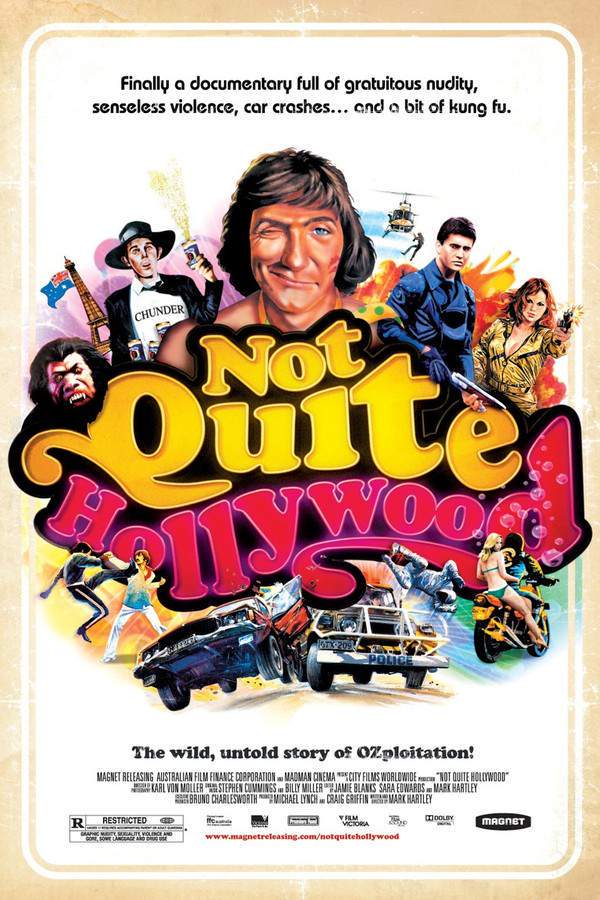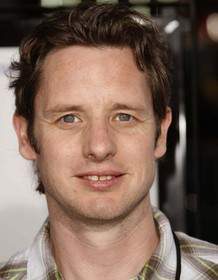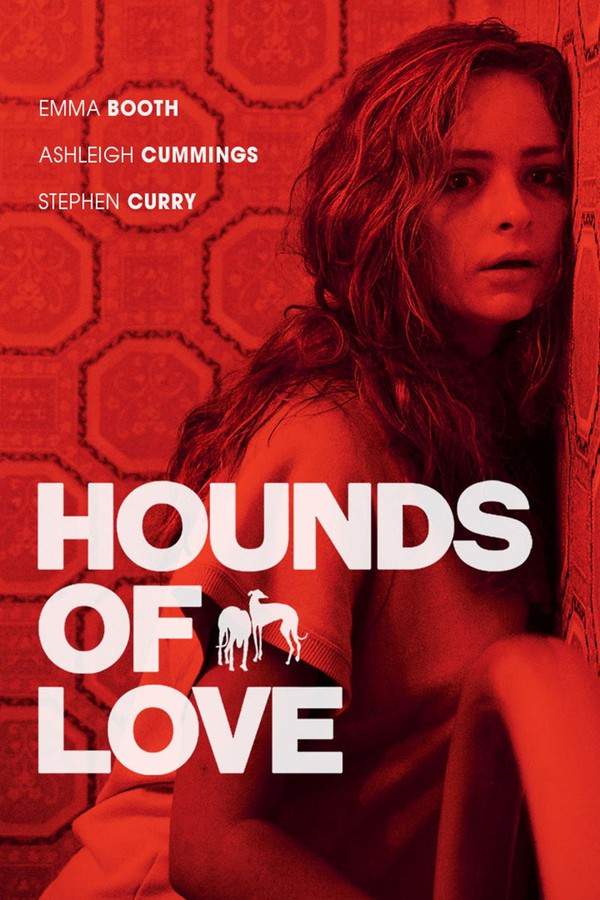
Not Quite Hollywood: The Wild, Untold Story of Ozploitation! 2009
Directed by

Mark Hartley
Made by

Magnet Releasing
Test your knowledge of Not Quite Hollywood: The Wild, Untold Story of Ozploitation! with our quiz!
Not Quite Hollywood: The Wild, Untold Story of Ozploitation! Plot Summary
Read the complete plot summary and ending explained for Not Quite Hollywood: The Wild, Untold Story of Ozploitation! (2009). From turning points to emotional moments, uncover what really happened and why it matters.
The mythologized Australian film renaissance of the 1970s has been extensively explored, showcasing iconic films such as Sunday Too Far Away, Picnic At Hanging Rock, and My Brilliant Career. But does the full narrative truly capture the essence of this pivotal era?
This documentary dives into a transformative time when decades of strict censorship came to an abrupt halt. Australian cinema threw off the constraints of its conservative beginnings and began to create films aimed squarely at mass enjoyment. The result was an explosion of varied content, featuring everything from raunchy sex comedies to gruesome horror stories and adrenaline-fueled action flicks, all resonating with audiences both locally and globally.
During this vibrant period, Australia’s cinematic legends were characterized by their reckless abandon, where male protagonists were often fuelled by white-line fever, while their female counterparts were depicted as both appealing and sexually liberated. The stunt work on display astounded viewers, with daring feats that truly took life and limb into the balance.
Welcome to NOT QUITE HOLLYWOOD—a riotous and exhilarating exploration of OZPLOITATION cinema. This documentary reveals a time when Australian filmmakers boldly embraced themes of sex, violence, horror, and relentless action. Unlike standard documentaries laden with tedious stories from uninspired historians, this film captures firsthand accounts from the scene’s actual creators—trailblazers who defied norms, broke boundaries, and introduced game-changing elements to the cinema, including car chases, karate moves, BMX bikes, and the infamous waterbed!
With its rich tapestry of outrageous stories, insights into guerrilla filmmaking, and appearances from international enthusiasts like Quentin Tarantino, NOT QUITE HOLLYWOOD serves as an energetic and entertaining journey through a forgotten chapter of cinema, fully loaded with unapologetic elements of eroticism and excitement.
Not Quite Hollywood: The Wild, Untold Story of Ozploitation! Timeline
Follow the complete movie timeline of Not Quite Hollywood: The Wild, Untold Story of Ozploitation! (2009) with every major event in chronological order. Great for understanding complex plots and story progression.
The Australian Film Renaissance
The 1970s marked a significant shift in Australian cinema, moving away from the conservative film landscape that had previously dominated the industry. Iconic films such as *Sunday Too Far Away* and *Picnic At Hanging Rock* emerged, showcasing the burgeoning talent and creativity of filmmakers during this pivotal era.
Censorship Breakthrough
For decades, strict censorship had stifled Australian filmmakers, limiting their creative expression. However, this decade saw the constraints lifted, allowing for more diverse and daring content that appealed to mass audiences both locally and globally.
Explosion of Content
With the removal of censorship, Australian cinema experienced a surge in filmmaking across various genres. This period was characterized by the production of raunchy sex comedies, gruesome horror stories, and exhilarating action flicks, radically expanding the cinematic landscape.
Archetypal Characters in Cinema
The male protagonists of the era were often depicted with a sense of reckless abandon, embodying the spirit of 'white-line fever'. This reflected the broader societal attitudes of the time, where men sought excitement and danger in their pursuits, reinforcing a rugged cinematic image.
Empowerment of Female Characters
In stark contrast to earlier portrayals, female characters in Australian films of the 1970s were depicted as appealing, sexually liberated, and often integral to the plot. Their representation became a symbol of the shifting societal norms, breaking from traditional gender roles.
Stunt Work and Daring Feats
The era was marked by exceptional stunt work that captivated audiences. Filmmakers took risks by incorporating daring performances that tested the limits of physical capability, making action-packed scenes even more thrilling.
Rise of OZPLOITATION Cinema
The documentary *NOT QUITE HOLLYWOOD* delves into the phenomenon of OZPLOITATION cinema, which encapsulates the wild and exuberant style of filmmaking unique to Australia. This genre thrives on themes of sex, violence, horror, and extreme action, emblematic of the era's rebellious spirit.
Voices of the Filmmakers
Unlike traditional documentaries that rely on historical narratives, *NOT QUITE HOLLYWOOD* showcases firsthand accounts from the trailblazing filmmakers who shaped the era. Their insights provide an authentic look at the challenges and triumphs of redefining Australian cinema.
Innovative Filmmaking Techniques
The filmmakers of this era employed guerrilla filmmaking techniques that pushed the envelope. This included creative use of limited resources and unconventional shooting methods, allowing for the production of films that were energetic and raw, resonating with audiences.
Influence of Quentin Tarantino
Quentin Tarantino, a prominent figure in modern cinema, expressed his admiration for the daring Australian films of the 1970s. His involvement in the documentary highlights the lasting impact and influence these films have had on global cinema.
The Advent of Car Chases and Action Scenes
As part of the hallmark features of OZPLOITATION cinema, thrilling car chases became a staple in many films. These adrenaline-fueled sequences showcased the filmmakers' commitment to pushing boundaries and delivering exciting content.
Cultural Reflections
The themes and stories explored in 1970s Australian cinema reflected the social and cultural changes happening at the time. Filmmakers used their work to comment on Australian identity, confronting issues like sexuality, violence, and personal freedom.
Legacy of the Era
The impact of 1970s Australian cinema continues to be felt today, as it laid the groundwork for future generations of filmmakers. The bold themes and narrative styles introduced during this time reshaped the landscape of Australian film and influenced global cinema trends.
Eroticism and Excitement
The intersection of eroticism and action in films from this period captivated a wide audience, celebrating themes that had previously been taboo. This unapologetic embrace of excitement set a new standard in filmmaking that echoed through subsequent eras.
Not Quite Hollywood: The Wild, Untold Story of Ozploitation! Settings
Learn where and when Not Quite Hollywood: The Wild, Untold Story of Ozploitation! (2009) takes place. Explore the film’s settings, era, and how they shape the narrative.
Time period
1970s
The 1970s were marked by significant social changes and cultural revolutions globally, including in Australia. This era witnessed the lifting of censorship, which unleashed a wave of artistic freedom in filmmaking. It was a time when filmmakers could explore controversial themes without fear, leading to groundbreaking works that challenged conventional narratives.
Location
Australia
Australia during the 1970s was a vibrant landscape for the evolution of cinema, especially with the rise of the Ozploitation genre. Known for its breathtaking scenery and diverse culture, it became a playground for filmmakers looking to push boundaries. The decade saw a surge in creative expression, breaking free from strict censorship laws, allowing unique stories to emerge.
Not Quite Hollywood: The Wild, Untold Story of Ozploitation! Themes
Discover the main themes in Not Quite Hollywood: The Wild, Untold Story of Ozploitation! (2009). Analyze the deeper meanings, emotional layers, and social commentary behind the film.
🎬
Cinema Revolution
The theme of cinema revolution is prevalent in the documentary as it explores the transformative period of Australian filmmaking in the 1970s. This era saw filmmakers embrace creative freedom, resulting in a surge of diverse and often provocative films. It highlights the shift from conservative storytelling to daring narratives that included sex, violence, and action.
🔥
Recklessness
Recklessness is a central theme in Ozploitation cinema, depicting characters often involved in high-speed chases and daring stunts. The filmmakers showcased not only the thrill of these actions but also the cultural implications of this recklessness within Australian society. It was a celebration of youthful exuberance and bold storytelling.
💃
Sexual Liberation
Sexual liberation is another key theme explored in this documentary, reflecting the evolving attitudes towards sexuality during the 1970s. Female characters emerged as sexually liberated figures, challenging traditional roles and expectations. This theme emphasizes the boldness of filmmakers in addressing eroticism and relationships openly.

Coming soon on iOS and Android
The Plot Explained Mobile App
From blockbusters to hidden gems — dive into movie stories anytime, anywhere. Save your favorites, discover plots faster, and never miss a twist again.
Sign up to be the first to know when we launch. Your email stays private — always.
Not Quite Hollywood: The Wild, Untold Story of Ozploitation! Spoiler-Free Summary
Discover the spoiler-free summary of Not Quite Hollywood: The Wild, Untold Story of Ozploitation! (2009). Get a concise overview without any spoilers.
In the early 1970s a sudden crack in Australia’s long‑standing censorship opened a floodgate of creative energy, and a new, gritty brand of cinema burst onto the scene. Freed from the constraints of the past, filmmakers began to craft movies that were unapologetically loud, visceral, and designed for pure audience thrill. The documentary sets its focus on this whirlwind era—an Australia where sun‑baked deserts, neon‑lit nightclubs, and ramshackle back‑lots became the playground for a genre later christened Ozploitation. The world it paints is one of restless ambition, where every frame pulses with the promise of something wilder than the last.
The tone is electric, a heady blend of bawdy humor, brutal action, and lurid horror that mirrors the very films it celebrates. Male protagonists swagger through chaotic chases and white‑line‑fueled escapades, while female characters stride with a fierce, liberated sexuality that both challenges and exploits the era’s conventions. Stunt work becomes a spectacle of daring, with car crashes, martial‑arts showdowns, BMX rides, and even the infamous water‑bed daring to push the limits of what could be filmed on a shoestring budget. The result is a cinematic tapestry that feels simultaneously raw and exhilarating, an ode to a time when danger and delight were served in equal measure.
At its heart, the film follows the real‑life creators who forged this legacy, letting their own voices steer the narrative. Interviews with the directors, stunt coordinators, and actors who lived the madness are interwoven with commentary from international enthusiasts like Quentin Tarantino, whose reverence adds an outsider’s admiration to the insider’s anecdotes. These trailblazers act as both protagonists and historians, guiding the audience through behind‑the‑scenes stories that echo the bold spirit of their work.
The documentary invites viewers into a forgotten chapter of film history with a sense of wonder and mischief. Its style is as kinetic as the movies it examines, promising a vivid, riotous journey through an era where sex, violence, horror, and high‑octane action collided in a uniquely Australian fever dream—leaving an indelible mark on the global imagination.
Can’t find your movie? Request a summary here.
Movies with Similar Twists and Themes
Uncover films that echo the narrative beats, emotional arcs, or dramatic twists of the one you're exploring. These recommendations are handpicked based on story depth, thematic resonance, and spoiler-worthy moments — perfect for fans who crave more of the same intrigue.
Featured on this page

What's After the Movie?
Not sure whether to stay after the credits? Find out!
Explore Our Movie Platform
New Movie Releases (2026)
Famous Movie Actors
Top Film Production Studios
Movie Plot Summaries & Endings
Major Movie Awards & Winners
Best Concert Films & Music Documentaries
Movie Collections and Curated Lists
© 2026 What's After the Movie. All rights reserved.






